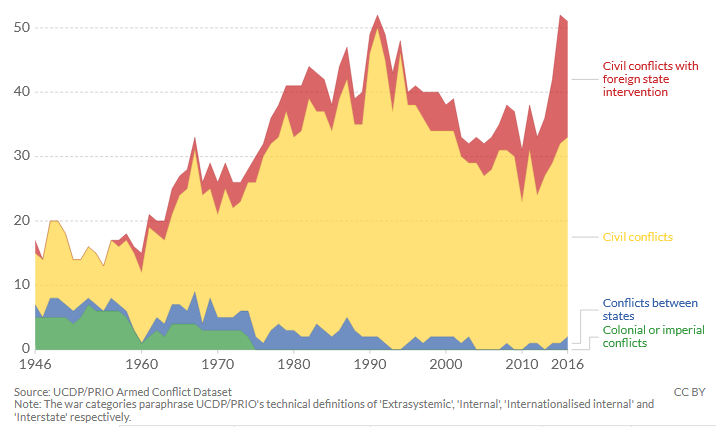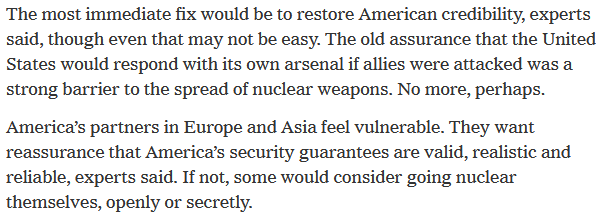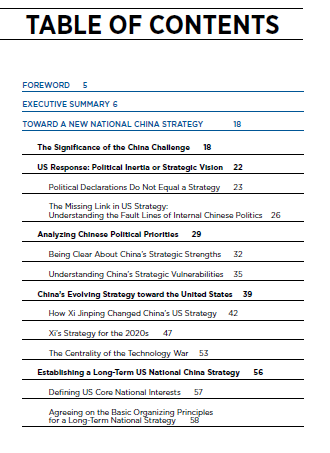
What causes civil wars? Are they driven by ethnic differences? By poverty? Something else?
Here is how my Quantitative Security students will explore those questions.
[THREAD]
Here is how my Quantitative Security students will explore those questions.
[THREAD]
Unlike the quantitative study of interstate war, civil wars didn't receive big attention until the 1990s. That decade witnessed a spike in the number of internal wars, especially relative to "inter-state wars".
Source: ourworldindata.org/war-and-peace & @UCDP
Source: ourworldindata.org/war-and-peace & @UCDP

An important early paper seeking to identify trends in civil wars was by Licklider in @apsrjournal
cambridge.org/core/journals/…
cambridge.org/core/journals/…
As the title of the paper suggests, the goal is to understand how civil wars end. As a starting point, Licklider creates a list of wars.
He started with a list of war case studies drawn from a @USIP funded project 

The problem is that these wars did not comprise a random sample (where the Small & Singer reference is to the Correlates of War data on intra-state war: correlatesofwar.org/data-sets/COW-…) 

The remedy was to create his own list of wars, which he acknowledges is "fairly primitive" and incomplete. 

Notice that Licklider draws from a number of sources to create his list. These sources, such as the book by Paul Pillar, draw from Small and Singer (already mentioned) and Quincy Wright
press.uchicago.edu/ucp/books/book…
press.uchicago.edu/ucp/books/book…
The Small & Singer list of civil wars would prove important for a paper published shortly after Licklider's: Paul Collier's and @AnkeHoeffler's 1998 paper in Oxford Economic Papers
academic.oup.com/oep/article-ab…
academic.oup.com/oep/article-ab…
This seminal paper sought to identify whether ethnic differences or economic factors explained civil war onset.
Using data from the 1960s to the 1990s, they found that GPD per capita (income) & natural resource exports (primary) have a key influence, but not ethnicity (ELF)
Using data from the 1960s to the 1990s, they found that GPD per capita (income) & natural resource exports (primary) have a key influence, but not ethnicity (ELF)

This paper was then directly built upon by David Laitin and James Fearon in their own seminal 2003 @apsrjournal paper
cambridge.org/core/journals/…
cambridge.org/core/journals/…
Their paper is essentially reevaluating Hoeffler and Collier, namely their interpretation that civil war is driven more by "Greed" (i.e. economic factors) than "Grievance" (i.e. ethnicity factors) 

To carry out this challenge, Fearon and Laitin start by creating their own list of civil wars. In doing so, they build on previous lists (the earliest of which is Licklider's) 



They then collect data on a BUNCH of potential explanatory variables, the most important of which (for the purposes of comparing to Collier and Hoeffler) are GDP per capita and ELF.
Here is their regression results: similar to Collier & Hoeffler, income matters but ELF does not.
Here is their regression results: similar to Collier & Hoeffler, income matters but ELF does not.

At this point, it seems that economic factors, not ethnic differences, were a key driver of civil war onset.
But there was a big problem: how these studies measured ethnicity.
Specifically, they relied on the Soviet Narodov Mira atlas created in 1964 (here is the description from Fearon and Laitin)
Specifically, they relied on the Soviet Narodov Mira atlas created in 1964 (here is the description from Fearon and Laitin)

Why does this matter? Because it is a measure of the ethnic composition of a country for that one year.
In other words, it is a constant for every year in the Fearon and Laitin data.
In other words, it is a constant for every year in the Fearon and Laitin data.
You can access the Naradov Mira data here: worldmap.harvard.edu/data/geonode:N…
Given the importance of this variable, seems we could do better.
That's exactly what Cederman, Wimmer, and Min do in a 2010 @World_Pol paper
cambridge.org/core/journals/…
That's exactly what Cederman, Wimmer, and Min do in a 2010 @World_Pol paper
cambridge.org/core/journals/…
They introduce the Ethnic Power Relations (EPR) dataset, which was constructed by consulting regional and country experts 

The EPR data are available here: icr.ethz.ch/data/epr/
Using EPR instead of ELF, what do they find?
Using the "group-country-year" as the unit of analysis (rather than the "country-year" like the previous studies), find that ethnic differences do matter, particularly if the group is excluded from having access to central power.
Using the "group-country-year" as the unit of analysis (rather than the "country-year" like the previous studies), find that ethnic differences do matter, particularly if the group is excluded from having access to central power.

Subsequent work continued to find that the more fine-grained and sub-state analysis of ethnic differences drove civil wars.
For example, consider the very recent contribution by @austinlwright, David Carter, and Andrew Shaver in @The_JOP
journals.uchicago.edu/doi/abs/10.108…
For example, consider the very recent contribution by @austinlwright, David Carter, and Andrew Shaver in @The_JOP
journals.uchicago.edu/doi/abs/10.108…

The paper demonstrates how far the civil war scholarship has advanced in terms of measurement:
- EPR data (not ELF).
- Geo-referenced conflict data from @UCDP (not COW)
- EPR data (not ELF).
- Geo-referenced conflict data from @UCDP (not COW)

What they find is that terrain matters BECAUSE it drives ethnic differences -- in other words, ethnicity is the mediating variable linking terrain to civil war onset (rather than terrain or ethnicity having an independent effect) 

The research continues -- indeed, the study of civil war now dominates @JPR_journal, JCR, and other conflict journals -- with scholars conducting ever more refined, micro-level studies.
But the current state of knowledge is that ethnic differences (particularly, ethnic exclusion) RAISE the probability of civil war, with wealth remaining a key factor in REDUCING that probability.
[END]
[END]
• • •
Missing some Tweet in this thread? You can try to
force a refresh













